-
 bitcoin
bitcoin $87959.907984 USD
1.34% -
 ethereum
ethereum $2920.497338 USD
3.04% -
 tether
tether $0.999775 USD
0.00% -
 xrp
xrp $2.237324 USD
8.12% -
 bnb
bnb $860.243768 USD
0.90% -
 solana
solana $138.089498 USD
5.43% -
 usd-coin
usd-coin $0.999807 USD
0.01% -
 tron
tron $0.272801 USD
-1.53% -
 dogecoin
dogecoin $0.150904 USD
2.96% -
 cardano
cardano $0.421635 USD
1.97% -
 hyperliquid
hyperliquid $32.152445 USD
2.23% -
 bitcoin-cash
bitcoin-cash $533.301069 USD
-1.94% -
 chainlink
chainlink $12.953417 USD
2.68% -
 unus-sed-leo
unus-sed-leo $9.535951 USD
0.73% -
 zcash
zcash $521.483386 USD
-2.87%
How does cloud computing support the metaverse? Can distributed computing power meet huge demands?
Cloud computing supports the metaverse by providing scalability, distributed computing power, and robust security, ensuring a seamless and immersive user experience.
May 08, 2025 at 05:15 pm
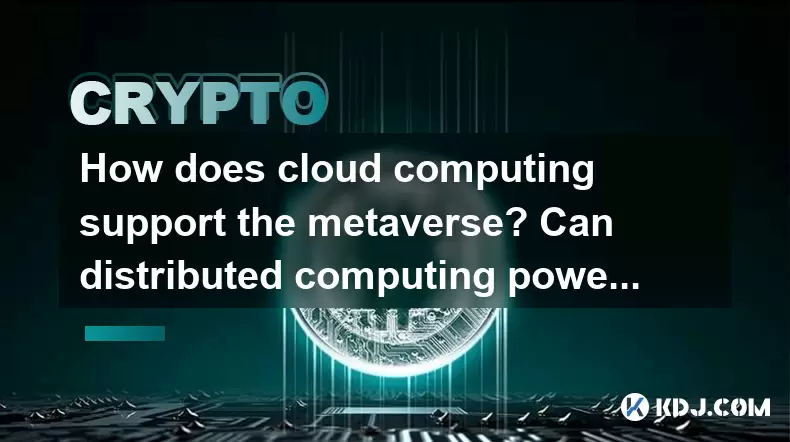
Cloud computing plays a pivotal role in supporting the metaverse, a virtual reality space where users can interact with a computer-generated environment and other users. The metaverse requires significant computational resources to render complex, real-time environments and to handle the interactions of potentially millions of users simultaneously. Cloud computing provides the necessary infrastructure to manage these demands efficiently.
One of the primary ways cloud computing supports the metaverse is through scalability. The metaverse can experience fluctuating demands based on user activity, events, and new content releases. Cloud computing allows for the dynamic allocation of resources, ensuring that the metaverse can scale up or down as needed without compromising performance. This scalability is crucial for maintaining a seamless user experience, as it prevents lag and downtime during peak usage times.
Distributed computing power is another critical aspect of supporting the metaverse. The sheer volume of data processing and rendering required for the metaverse can be overwhelming for a single server or a centralized system. Distributed computing, facilitated by cloud services, allows the workload to be spread across multiple servers and data centers worldwide. This not only enhances performance but also increases reliability, as the system can continue to function even if one part of the network fails.
Data storage and management are also significantly enhanced by cloud computing. The metaverse generates vast amounts of data, including user interactions, virtual asset transactions, and environmental changes. Cloud storage solutions provide a scalable and secure way to store and manage this data. Additionally, cloud services often include advanced data analytics tools that can be used to optimize the metaverse's performance and user experience.
Security and privacy are paramount in the metaverse, where users engage in various activities, including financial transactions and personal interactions. Cloud computing offers robust security measures, such as encryption and secure access controls, to protect user data and ensure privacy. Moreover, cloud providers often have dedicated teams and resources to monitor and respond to security threats, adding an extra layer of protection for the metaverse.
How Cloud Computing Enhances User Experience in the Metaverse
The user experience in the metaverse is heavily dependent on the underlying technology's ability to deliver smooth, immersive interactions. Cloud computing enhances this experience in several ways. Firstly, it enables low-latency connections, which are essential for real-time interactions in virtual environments. By leveraging cloud services, the metaverse can ensure that users experience minimal delays, enhancing the feeling of presence and immersion.
Secondly, cloud computing supports advanced graphics and rendering. The metaverse often features highly detailed and dynamic environments that require significant computational power to render in real-time. Cloud services can offload this processing from users' devices to powerful servers, allowing for more complex and visually stunning virtual worlds.
Additionally, cloud computing facilitates seamless integration of various services and applications within the metaverse. Users may want to access different tools, games, or social platforms within the virtual environment. Cloud services can manage these integrations efficiently, ensuring that users can switch between different applications without experiencing disruptions.
The Role of Distributed Computing in Meeting Huge Demands
The metaverse's demand for computing power can be enormous, especially during peak times or when hosting large-scale events. Distributed computing plays a crucial role in meeting these demands. By distributing the workload across multiple servers and data centers, the system can handle a higher volume of users and more complex computations without performance degradation.
Load balancing is a key feature of distributed computing that helps manage the metaverse's demands. Load balancers distribute incoming user requests across multiple servers, ensuring that no single server becomes overwhelmed. This not only improves performance but also enhances the system's resilience, as it can continue to operate even if some servers fail.
Edge computing is another aspect of distributed computing that can benefit the metaverse. By processing data closer to the user, edge computing reduces latency and improves the responsiveness of the virtual environment. This is particularly important for applications that require real-time interactions, such as gaming and virtual meetings.
Challenges and Solutions in Cloud and Distributed Computing for the Metaverse
While cloud and distributed computing offer significant benefits for the metaverse, they also present certain challenges. One major challenge is the cost of maintaining and scaling cloud infrastructure. The metaverse's high demand for computing resources can lead to substantial expenses for service providers. To address this, many companies are exploring hybrid cloud solutions, which combine public and private cloud resources to optimize costs and performance.
Another challenge is ensuring consistent performance across different regions. The metaverse is a global platform, and users from various parts of the world need to experience the same level of performance. To tackle this, cloud providers are investing in global data center networks to reduce latency and improve connectivity for users worldwide.
Data sovereignty and compliance are also significant concerns. Different countries have varying regulations regarding data storage and privacy. Cloud providers must navigate these regulations to ensure that the metaverse complies with local laws while still providing a seamless user experience. This often involves implementing region-specific data storage solutions and ensuring that data transfers comply with international standards.
The Importance of Interoperability in Cloud Computing for the Metaverse
Interoperability is crucial for the success of the metaverse, as it allows different systems and services to work together seamlessly. Cloud computing plays a vital role in achieving this interoperability. By providing standardized APIs and protocols, cloud services enable different applications and platforms within the metaverse to communicate and share data effectively.
For instance, a user might want to transfer a virtual asset from one platform to another within the metaverse. Cloud computing can facilitate this transfer by providing a secure and efficient data exchange mechanism. This not only enhances the user experience but also fosters a more interconnected and vibrant virtual ecosystem.
Moreover, cloud computing supports the development of cross-platform applications that can run on various devices and operating systems. This is essential for the metaverse, as users may access the virtual environment from different types of devices, including VR headsets, smartphones, and computers. Cloud services can ensure that these applications deliver a consistent experience across all platforms.
Frequently Asked Questions
Q: How does cloud computing ensure data security in the metaverse?A: Cloud computing ensures data security in the metaverse through several measures, including encryption, secure access controls, and continuous monitoring for threats. Cloud providers often have dedicated security teams that work to protect user data and ensure compliance with privacy regulations.
Q: Can cloud computing handle the real-time rendering required for the metaverse?A: Yes, cloud computing can handle real-time rendering for the metaverse by offloading the processing from users' devices to powerful servers. This allows for more complex and visually stunning virtual environments, ensuring a smooth and immersive user experience.
Q: What role does edge computing play in supporting the metaverse?A: Edge computing plays a crucial role in supporting the metaverse by processing data closer to the user, which reduces latency and improves responsiveness. This is particularly important for applications that require real-time interactions, such as gaming and virtual meetings.
Q: How can cloud computing help with the scalability of the metaverse?A: Cloud computing helps with the scalability of the metaverse by allowing for the dynamic allocation of resources. This ensures that the metaverse can scale up or down based on user demand, maintaining performance and preventing lag during peak usage times.
Disclaimer:info@kdj.com
The information provided is not trading advice. kdj.com does not assume any responsibility for any investments made based on the information provided in this article. Cryptocurrencies are highly volatile and it is highly recommended that you invest with caution after thorough research!
If you believe that the content used on this website infringes your copyright, please contact us immediately (info@kdj.com) and we will delete it promptly.
- The Epstein Files & Satoshi's Shadow: Emails Exposed, Crypto's Past Reimagined
- 2026-02-03 12:35:01
- BlockDAG's $450M+ Presale Countdown: The 100x Opportunity About to Vanish
- 2026-02-03 12:50:01
- Coast Mountain Transit Workers Kick Off Bargaining, Demanding Fair Wages and Safer Conditions
- 2026-02-03 09:55:01
- Trump, Cryptocurrency, Unprecedented Claim: A Digital Divide in the Empire State
- 2026-02-03 10:00:02
- Natural Gas Prices Plummet Amid Warmer Forecasts, Supply Rebound
- 2026-02-03 09:50:01
- Michael Saylor's $54 Billion Bitcoin Gamble Faces Maturity Wall Amidst Shifting Crypto Landscape
- 2026-02-03 09:45:01
Related knowledge
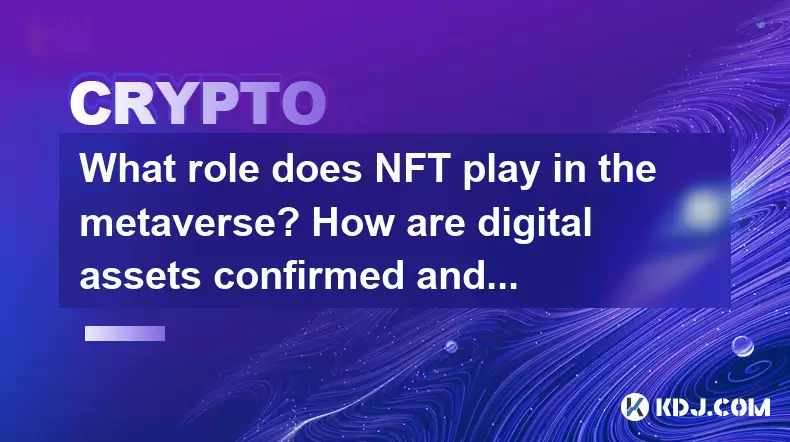
What role does NFT play in the metaverse? How are digital assets confirmed and circulated?
May 08,2025 at 01:56pm
The integration of Non-Fungible Tokens (NFTs) into the metaverse has revolutionized the way digital assets are owned, confirmed, and circulated within...

How does cloud computing support the metaverse? Can distributed computing power meet huge demands?
May 08,2025 at 05:15pm
Cloud computing plays a pivotal role in supporting the metaverse, a virtual reality space where users can interact with a computer-generated environme...
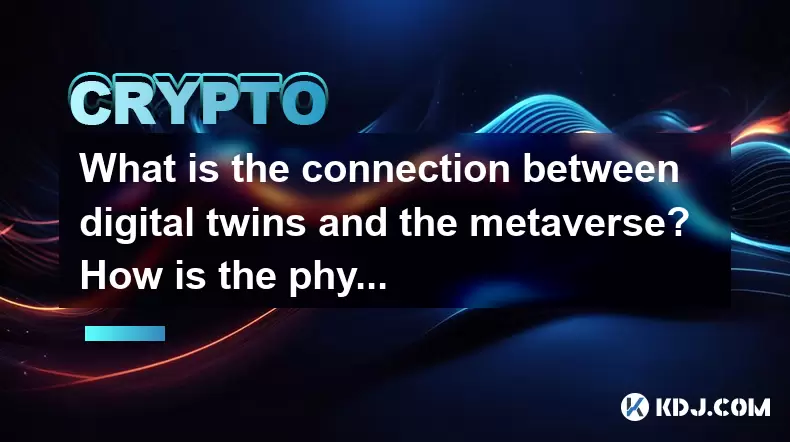
What is the connection between digital twins and the metaverse? How is the physical world mapped to the virtual space?
May 08,2025 at 05:43am
The concept of digital twins and the metaverse has become increasingly intertwined within the cryptocurrency and blockchain community, as both technol...
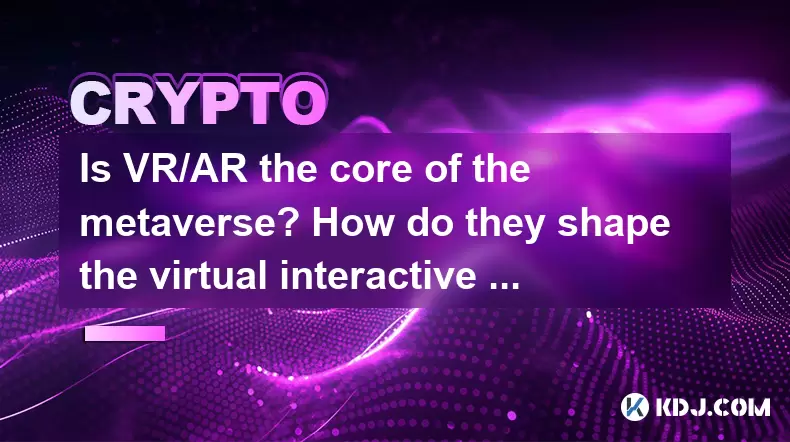
Is VR/AR the core of the metaverse? How do they shape the virtual interactive experience?
May 11,2025 at 02:15pm
The concept of the metaverse has become increasingly popular within the cryptocurrency circle, often intertwined with discussions about virtual realit...

How does 5G promote the development of the metaverse? How important is high-speed network for immersive experience?
May 08,2025 at 04:21am
The relationship between 5G technology and the development of the metaverse is intricate and pivotal. 5G, with its high-speed, low-latency, and high-c...
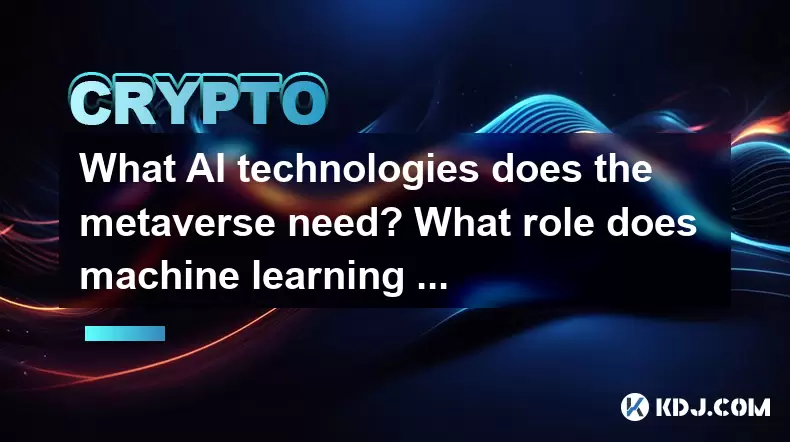
What AI technologies does the metaverse need? What role does machine learning play in virtual environments?
May 08,2025 at 06:08am
The metaverse, a collective virtual shared space, relies heavily on advanced AI technologies to create immersive and interactive environments. AI tech...

What role does NFT play in the metaverse? How are digital assets confirmed and circulated?
May 08,2025 at 01:56pm
The integration of Non-Fungible Tokens (NFTs) into the metaverse has revolutionized the way digital assets are owned, confirmed, and circulated within...

How does cloud computing support the metaverse? Can distributed computing power meet huge demands?
May 08,2025 at 05:15pm
Cloud computing plays a pivotal role in supporting the metaverse, a virtual reality space where users can interact with a computer-generated environme...

What is the connection between digital twins and the metaverse? How is the physical world mapped to the virtual space?
May 08,2025 at 05:43am
The concept of digital twins and the metaverse has become increasingly intertwined within the cryptocurrency and blockchain community, as both technol...

Is VR/AR the core of the metaverse? How do they shape the virtual interactive experience?
May 11,2025 at 02:15pm
The concept of the metaverse has become increasingly popular within the cryptocurrency circle, often intertwined with discussions about virtual realit...

How does 5G promote the development of the metaverse? How important is high-speed network for immersive experience?
May 08,2025 at 04:21am
The relationship between 5G technology and the development of the metaverse is intricate and pivotal. 5G, with its high-speed, low-latency, and high-c...

What AI technologies does the metaverse need? What role does machine learning play in virtual environments?
May 08,2025 at 06:08am
The metaverse, a collective virtual shared space, relies heavily on advanced AI technologies to create immersive and interactive environments. AI tech...
See all articles

























![Discontinuum by: ArchitechGD 100% (1 coin) (Mobile) Geometry Dash [2.2] Discontinuum by: ArchitechGD 100% (1 coin) (Mobile) Geometry Dash [2.2]](/uploads/2026/02/03/cryptocurrencies-news/videos/origin_69814d99e6b61_image_500_375.webp)
















































